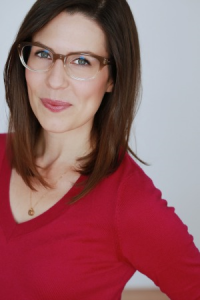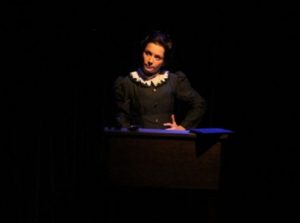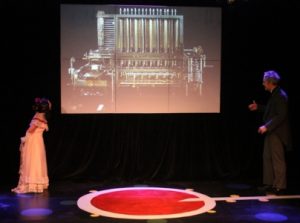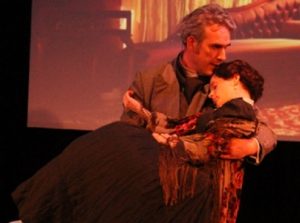The 2018 Essential Theatre Play Festival is back for its 20th year, through August 26 at the West End Performing Arts Center. This Atlanta-based summer festival is unique for its emphasis on Georgia playwrights, many of whom have gone on to national fame. This year’s repertory-style event features two extraordinary world premieres by young playwrights, BUILT TO FLOAT, a haunting magic realist story of two sisters by Rachael Graf Evans and WOKE, a powerful coming of age tale of two friends, one black, one white, transitioning from high school to college, by Avery Sharpe, as well as A BUNCH OF DIFFERENT WAYS I’D LIKE TO DIEge (2 nights only, Aug 16-17!), a one-man show written and performed by Tim McDonough, long-time Georgia Shakespeare actor and Theater Emory artistic director .
The man behind the curtain, so to speak, of the Essential Theatre is Founding Artistic Director Peter Hardy, who has been working in Atlanta as a writer, director, actor and producer for more than 30 years. His plays have won national awards and have received more than 30 productions around the country, and he’s a Suzi Bass Award-winning director. For many years he served as artistic director of the outdoor drama UNTO THESE HILLS in Cherokee, North Carolina. He’s also been seen onstage at Horizon Theatre, Actor’s Express, Aurora Theatre, Georgia Ensemble Theatre and Theatrical Outfit, and in the past two years has appeared in five productions at Shakespeare Tavern.
ATLRetro caught up with Peter to find out more about Essential Theatre and why this year’s festival should be “essential” to Atlanta theatre-goers, as well as what this Kool Kat is up to next.
Congratulations on this being the 20th annual festival. Why is this such a big deal and how did the opening go?
It’s always a challenge to produce brand-new plays, most of them by writers who—by definition—have no name-recognition value when we first present them. The fact that we’re still going—and doing better than ever, I think—in a summer theater season that is now dominated by big popular musicals, is something I’m really proud of. But every year, we have to fight for those audiences! Our opening weekend—for Rachel Graf Evans’ BUILT TO FLOAT—went just great, with a fantastic response from the crowd.
 Why did the festival decide to focus exclusively on Georgia playwrights? Haven’t some of the plays and playwrights gone on to national fame?
Why did the festival decide to focus exclusively on Georgia playwrights? Haven’t some of the plays and playwrights gone on to national fame?
In our early years, we would produce one new Georgia play each Festival, along with other Regional Premieres from around the country. But, as time went by, we got more and more good submissions from Georgia playwrights, and that was what we were becoming best known for, anyway, so we made that the focus of our mission. In 2001 we produced the first play by an 18-year-old from Decatur named Lauren Gunderson, (If you missed our 2017 Kool Kat interview with Lauren and ADA AND THE MEMORY ENGINE, catch up here), who has gone on to become—literally—the most produced American playwright of the past couple of years. After we did Topher Payne‘s EVELYN IN PURGATORY in 2012, he’s gone on to have his plays produced Off-Broadway, around the country, and at many of the theaters in the Atlanta area, as well as writing several television films. Jordan Pulliam‘s BAT-HAMLET—a comic mash-up of BATMAN and HAMLET—has gone on to eight further productions, including one that’s just about to open at Out of Box Theater in Marietta. Those are just the most obvious examples.
How do you select the winning plays?
Our submission deadline each year is April 23, Shakespeare’s birthday. For 2019, we got over 90 submissions, and they will be read and evaluated by volunteer readers, all writers and theater professionals. Ultimately I make the final decisions, in consultation with trusted advisors. We accept any kind of plays, on any subjects—they just have to be written by current Georgia residents, and we highly prefer scripts that would take at least an hour to perform. Artistic choices are always, ultimately, subjective, but my answer to the question “What kind of plays are you looking for?” is always “Good ones.”
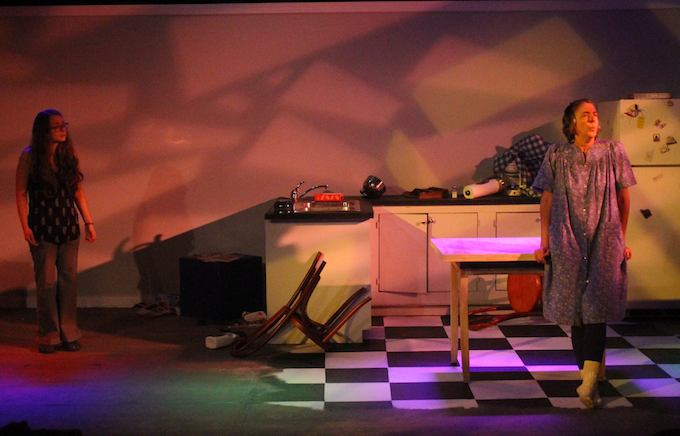
BUILT TO FLOAT. L-R: Rachel Wansker and Suzanne Roush. Hardy says this shot is “from a part of the show that is an extended haunted-house-of-the-mind sequence that has a nice ‘Caligari’ look to it. Photo credit: Elizabeth Cooper.
Tell us a little about each of the plays and playwrights? What about these stood out in the selection process and why should audiences come out? Maybe a favorite scene. Let’s start with BUILT TO FLOAT by Rachael Graf Evans.
BUILT TO FLOAT, early on, seems to be a standard family drama, about two adult sisters trying to cope with the legacy of their troubled—even traumatic—childhood. But it quickly becomes apparent that everything is not what it seems, and there are multiple levels of reality at play as we learn more and more about these characters and their lives. I love the way the play reveals and transforms itself as it goes on, like a flower unfolding itself. It takes the audience on a journey of understanding, and leads to a powerful and positive ending. All that may sound kind of vague, but really, I don’t want to give away too much!
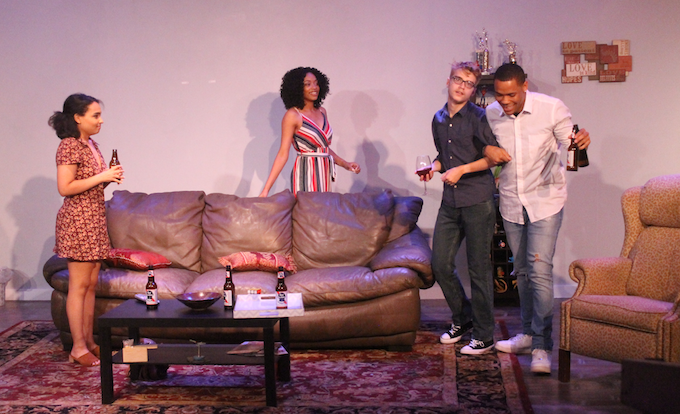
WOKE. L-R: Karina Simmons, DaShon Green, Paul Danner, Derrick Robertson. Photo credit: Elizabeth Cooper.
Next, WOKE by Avery Sharpe?
This is another play that takes you by surprise. It starts out like a comedy, with two high school graduates—one black, one white—who have been friends for years, just goofing around with each other, talking about girl and parents and their favorite rappers. We see them awkwardly moving toward serious relationships with a couple of girls they like. But then they have a real falling out when it comes to their very different understandings and opinions about racial injustice, and the epidemic of young black men being killed by police. It becomes a very thought-provoking examination of prejudice and privilege, but in the end it’s still a strong story of friendship and people trying to understand and communicate with each other.
By the way.I’m particularly pleased that this year—for our 20th Annual Festival— we’re producing the World Premieres of two young writers, each of them just starting out in their careers!
And finally A BUNCH OF DIFFERENT WAYS I’D LIKE TO DIE, the one-man show written and performed by actor Tim McDonough? As I recall (but may be incorrect), the festival usually has included two shows?
For many years, we produced three plays in repertory, for the Festival. Since 2014 we’ve been doing only two—along with some staged readings in our Bare Essentials series. But last year, as an extra attraction, we presented two performances of a one-man show called INDEPENDENT, featuring popular local actor Dan Triandiflou—and written by John D. Babcock—about the legendary actor-filmmaker John Cassavettes. We didn’t really have to “produce” it so much as give them a time-slot in the Festival, and it gave us the chance to present more offerings, making it more of a “festival.” This year we’re doing the same thing with Tim McDonough’s one-man show, a darkly comic meditation on mortality—you know, how he’d like to die, and what kind of lighting he would like to have. Tim was Artistic Director at Theatre Emory for years, and has been a distinguished Atlanta actor since the 80s.
Atlanta isn’t always thought of as a theater city and yet there are some tremendous performances happening here in this city. What would you say to a New Yorker or anyone else not from Atlanta who is skeptical about our theater scene?
Anyone who doesn’t think Atlanta is a theater city should take a look at the huge number of producing companies there are, all over the metropolitan area. I don’t know of any other city in the South, anyway, nor in many states around the country, that have so much theater to offer. Of course, the booming film-TV industry that has grown up in the area means there is more and more acting talent to draw on, all the time. And where you’ve got a bunch of actors, you’re going to have a lot of theater happening.
What’s the secret origin behind the Essential Theatre and the festival, and have you been involved from the start or how did you get involved?
In the early 80s, I spent several years in New York City, temping and directing small Nowhere-NEAR-Broadway productions, some of which I put together. When I moved to Atlanta in 1986, I started doing independent projects under the name of the Essential Theatre, along with acting and directing for other companies. Back then, “The Essential Theatre” was just me getting some people together and doing a show. But they were few and far between, and usually in a different venue every time. And, even though we got some good reviews and audiences, we never got much recognition. It was hard for an independent show to get noticed. Also, I tended to do plays I had written, or little-known plays by other writers, so it was even easier for us to fall through the cracks. Around 1998 I got the idea: “Maybe if we do THREE plays no one has heard of, it will get more attention.” And so the idea of doing a Festival was born—and right away, it worked, and we had a feature article in Creative Loafing for the first Festival, in 1999. Once we started doing the annual Festival, it slowly began to be a company, and not just me calling people up. We have a General Manager, Jennifer Kimball, who has taken us to a whole new business level, and there are designers, directors and technicians who have been working with us for years, and actors who have done many show with us.
When did you first get started in theater and is there a story behind that? Did you always want to be an actor/playwright/director?
My parents were in theater—working both professionally and in universities, where they taught. I mostly grew up in Chapel Hill, North Carolina, where they were professors at UNC. When I first went to college, I rebelled against my parents for a while by considering becoming a history or English scholar, and I changed majors several times. Eventually, I realized I wasn’t good at anything but theater and writing. I’ve been pursing writing and directing since college, and occasionally acting—though, in recent years, I’ve been appearing onstage more, most often at the Shakespeare Tavern. I never had a great desire to do Shakespeare, but I’ve found that I quite enjoy it.
Because we are ATLRetro, we have to ask who are a few of your favorite 20th century playwrights? Who are inspirations and favorite plays and a sentence or two as to why?
I love and appreciate many, many playwrights—and novelists and musicians and filmmakers, etc.—but the two who most directly and specifically inspired and excited me, starting around 1980, were John Guare and Sam Shepard. Guare wrote SIX DEGREES OF SEPARATION and HOUSE OF BLUE LEAVES and other, wonderful, lesser-known works, like MARCO POLO SINGS A SOLO, and I loved the way his scripts blended comedy and tragedy and melodrama and surrealism—that was a direct influence on my own writing. And, when I was living in New York City, I saw the original productions of Shepard’s FOOL FOR LOVE and A LIE OF THE MIND, both directed by him—and they changed my life. They’re probably the two most amazing productions I’ve ever seen. At their best, they tap into something deep and mythic about American families and the battlefield of love between men and women.
When/where will we see you or one of your works onstage again as a playwright, director or actor?
Right now the Essential Festival is completely absorbing me—then we’ll start reading the close-to-100 scripts we received to be considered for next summer’s Festival. I don’t have any current plans to be back onstage soon, but hey—I’m available to audition! Send me an invite! And I’m always writing. I tend to take a long time to finish things, and I get distracted by other projects. But I’m—hopefully—lose to finishing a play called THE OTHER PART OF THE PICTURE, which was inspired by an apartment I had in my grad school days at Penn State. It’s about neighbors who gradually get to know each other better, but never as well as the audience does. And I’ve also been excited about a screenplay—my first full-length one—called NOCTURNAL, which is a Hitchcock-inspired psychological mystery. About a woman who, um, goes around swimming in other people’s pools, at night. And there’s a half-finished supernatural novel, DREAMLAND DRIVE-IN, which has been on the shelf for a while, but which I still like, and I fully intend to get back to it, one day, because I don’t want the cliché of a “half-finished novel” to add to my necklace of regrets.
Anything else you’d like to tell ATLRetro readers about the festival or the upcoming 2018-2019 Essential Theatre season?
The Essential Theatre doesn’t really have a “season”—we produce our annual Festival in the summer, and that’s mostly it, aside from occasional special development projects like one we recently started, that had to do with turning the story of Syrian refugees into theater pieces. So, check out the Festival at www.EssentialTheatre.com—we’re running through Aug. 26! And—this may or may not happen, but maybe soon—we really want to present a concert performance of a new musical called MEMORY LANE, which is about the residents of a senior home where many of the patients have Alzheimer’s Disease. We frequently do staged reading of new plays, which aren’t hard to put together, but with a musical, it’s more challenging. So, nothing is definite, but we really hope we can do something with that in September, on or near National Alzheimer’s Day.
Purchase tickets and find out more here!







